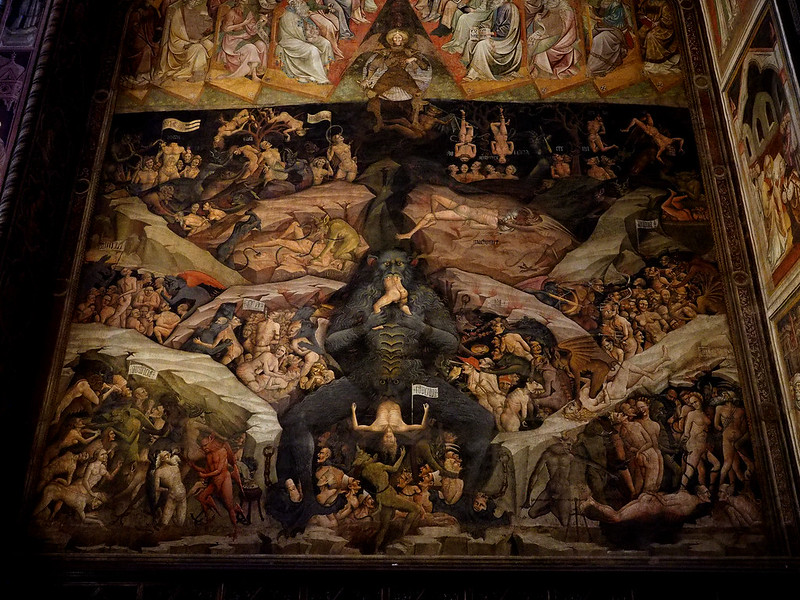Whereupon the proselytizer runs out of persuasion to win over the impenitent disbeliever, well, there’s always Hell. As with the history of many things the history of the origin of Hell as a concept is dimly lit. The earliest descriptions of Hell as a place of misery and unending torment for the wicked date back to ancient Greece, at least four hundred years before Jesus arrived on earth. But one thing seems certain, the authors of the Bible likely had no notion of the role that threats of perdition might play in winning over skeptics to Christianity. There seems to be no evidence of early Christians trying to frighten disbelievers to Christianity by holding out Hell as a consequence of their disbelief. Even where Hell is mentioned in the Bible, it’s ambiguous, described not as a roaring furnace of eternal suffering for the wicked, but more a place where the souls of the dead experience interminable joylessness with no celebration. Think of waiting in line at the DMV for all eternity, for instance.
No, the promise of Hell as punishment for unrepentant sinners was an invention that would come some two centuries later. For hundreds of years since then, various religious sects have re-imagined Hell into its many ghastly forms1. Fast forward through the Renaissance and the Age of Enlightenment to today, and it strains credulity that we continue to see examples of this fear mongering stapled to phone poles: The Wages of Sin Are Death!
…
Nowadays, it is easy to commiserate with the person whose growth into a rational human being was stunted by having to first overcome and eventually dispose of inculcated religious beliefs. Children don’t choose their upbringing, and most of them experience little direct control over what they are taught (and not taught). The need to purge the brain of handed down stories of creators and miracles and phantasms of every sort, and refocus its faculty for skepticism where it belongs – on the real world – is rightly viewed as a mental handicap. This tugs our heart strings no differently than would hearing word of the athlete who’s had to overcome a physical handicap to achieve some feat in sport. Having untrue things imposed on a young human mind represents a setback on the path to rationality, it takes time and can be hard to unlearn nonsense. And we should expect that for some people (too many, sadly) this extra effort will prove futile, as H. L. Mencken notes in the last chapter of his very fine book, Treatise On The Gods (2nd edition, page 274):
This common pattern of religion, like the similar pattern of government, has been impressed on the human consciousness for uncounted thousands of years, and it is no wonder that erasing it is an inordinately difficult matter, and, in the great majority of cases, impossible.
Throughout history, there probably never has existed an otherwise rational faculty entirely free of a small polyp of wonder regarding the existence of a merciful and benevolent supernatural being, the author of creation and all in it, at whose heavenly throne the souls will gather to adulate Him for, well, forever. This might help explain the hesitancy of the agnostic to go all in on hard atheism. But that form of doubt is most often benign and thus not a diagnosis that need concern us. It is in that person where the polyp of wonder is not excised but instead is nurtured over a lifetime, coddled instead of treated, and predictably metastasizes into a frank, irreversible piety. Its worst expressions sending the afflicted into a spasmodic, evangelical emergency exhorting the unrepentant to beg forgiveness and believe – or else! See, for instance, your favorite fire-‘n-brimstone TV evangelist. Perhaps no man should be dismissed outright merely for thumping a lectern and speaking his convictions, especially where his business is saving souls, but then failing to convince the skeptical it triggers in him the “or else!” and he lapses into fear mongering involving phantasms awaiting the wicked in perdition to devour them whole only to come out the other end, over and over again, forever – how can that be viewed as anything but doubling down on nonsense? How indeed can it be viewed as anything but a man without a faint of rationality left in the throes of a serious mental health crisis? And for those who would describe this diagnosis as condescension, we might recommend they get their own polyps biopsied! Would any rational 21st century man say the expression of schizophrenia is “just another opinion?”

1. The earliest known depictions of Hell in Christian art date to the 6th century, over five hundred years after Jesus’ death.
